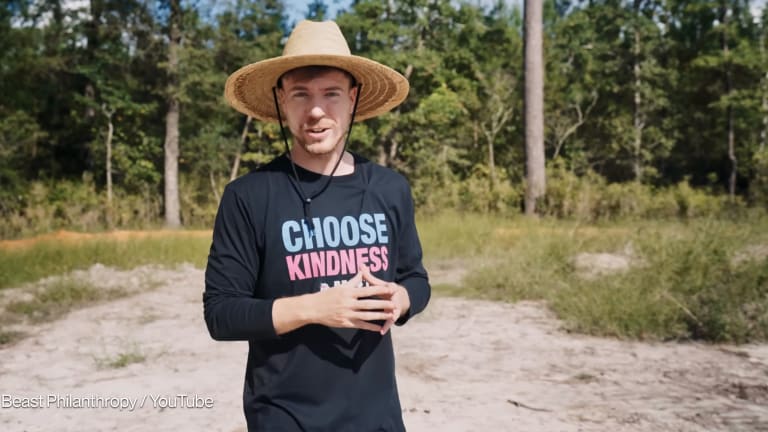
The international humanitarian aid community has been struggling with its fair share of issues, but there’s one avoidable shortcoming that gets Pulitzer Prize-winning journalist Nick Kristof “pissed off every day.”
“Really, one thing the humanitarian world doesn’t do so well is marketing,” The New York Times columnist explained to a packed audience on the last leg of the Social Good Summit in uptown Manhattan Monday afternoon. “People flinch at the idea of marketing … because it sounds like something that companies do, but it is so important to [get the] message right.”
Kristof is trying out a new marketing approach — online gaming — to further his girls’ and women’s empowerment movement that supports the book “Half the Sky,” which he co-authored and released with his wife and fellow journalist, Sheryl Wu-Dunn, in 2009.
The nonprofit Games for Change, alongside Intel Corp., will be releasing “Half the Sky Movement: The Game,” powered through Facebook, in mid-November. It goes with Games for Change’s general work of creating and promoting online games that connect with a social good mission. But how can aid groups take that approach a step further, and consider translating online fun and interest into fundraising techniques? Games for Change co-president Asi Burak offered some insight to Devex.
Aside from garnering public support and attention, how do you think aid groups can use and develop online games to solicit interest from potential donors?
I think that you can make a game around almost any issue. It is a lot about cracking it and understanding what you want to achieve. When we are approached by partners or people who want to make games we start with, “Wait. Before you come with an idea, let’s think about who you want to reach. What do you want to achieve? What is the context of the game? How are you going to measure success?” And with that framework it is much easier to come up with a creative idea. I would say it is not the easiest thing in the world. It is not very straightforward; it is challenging to make a game that is both fun and rewarding, while making a change in the world. So don’t approach it as a one-time thing. Approach it as something that you really invest in. It is not for the trend or the buzz. It is something that you make sure you think about — all the aspects and the planning.
Have you had aid organizations come to you that want to create a game and use it to reach donors?
All the time.
And what do you recommend to them?
I would recommend thinking very, very thoroughly about what they want to achieve and about what is the scope of the work they want to do. Games are also interesting if you compare them to movies and other media, in the sense there is such a breadth of platforms you can work with. You can make a game for $50,000 for mobile phones, but then you can make a game for $1 million on Facebook. You need to understand where you want to invest, where your audiences are going to be found. Facebook presents an amazing opportunity because people are kind of used to the idea of spending money. At the same time, it is very noisy, it is very competitive. Many people are trying to do things there. So, again, thinking about all of those challenges, asking the hard questions, being about not just the excitement of it, but being able to think through it.
Have you seen it done successfully — that organizations are actually able to raise substantial amounts of money using games?
I wouldn’t say that fundraising is the most common objective. People have great success with creating awareness … with driving people to do something. Fundraising is relatively new, but there are some great examples out there, like the game WeTopia [where] people play and aggregate something called “joy” and then they can spread the joy to NGOs and the company is giving part of their revenue to NGOs.
Do you need a partnership with a private sector company in order for something like this to work?
Not necessarily. It all depends how you want to go about it. … There is a public-private partnership [with WeTopia], and I think that makes it all the stronger. But I could see a case where an NGO just does a game to fundraise for its own causes.
What are the next innovations that you see being developed that could support the aid community?
I think the one thing that is going to really open the whole space is the whole idea that gamers, or players, are not going to only respond to things that are encrypted, but are going to start to be creators. And I think that will give it so much power. There are games like that already. But the whole idea that people will come with solutions that the designer didn’t even think about is going to be the future of games.
There is a game called Foldit. It was done by the researchers at the University of Washington. And all they did was they took the problem of protein folding, which is a big science issue, and what they did was they let players start folding those proteins. Now it is usually being tackled by super computers. And then the challenge: They said we have this specific problem that is related to HIV/AIDS and we want to see if the players can solve it. The computers didn’t solve it for 10 years. The players solved it in 10 days. So it was the power of the many. The designer didn’t have the solution but the players did.
Stay tuned for more coverage from this year’s Social Good Summit, and check out our conversations with other global development luminaries attending the event.
Search for articles
Most Read
- 1
- 2
- 3
- 4
- 5








